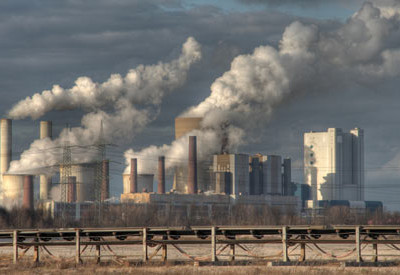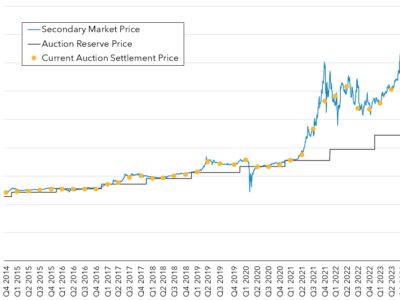Why the New Climate Reg for Coal is a Perfectly Normal EPA Rule
EPA's approach isn't a novel innovation. It's just EPA applying its usual approach.
Is EPA's new climate rule a sneaky effort to eliminate coal or a valid pollution standard? Some new arguments made by EPA convince me that it's pursuing a time-tested approach to pollution control. It's not that EPA is trying to grind down the industry. It's that the economics of coal-fired plants are so fragile that a mild breeze would give them pneumonia. Opponents are sure to legally challenge EPA's new rule to limit carbon emissions from coal-fired power p...
CONTINUE READINGEPA’s New Power Plant Rules Have Dropped. What Happens Next?
Media battles. Lawsuits. Stay requests. And political mayhem.
EPA has just issued a cluster of new rules designed to limit carbon emissions from power generators. Once upon a time, the presumption would have been that the rules would quietly go into effect, until someday a court rules on their validity. These days, we can expect a lot of action to be begin almost right away. First, we are likely to lawsuits filed before opponents have even had a chance to read the new rules. Opponents see the new rules as vulnerable because th...
CONTINUE READINGWe Need a True Debate Over Income-Graduated Fixed Charges
A state bill to cap the fixed charges utilities can collect in California would shut down an important debate about equity and rate design. Here’s a better way forward.
Electricity rate design is unavoidably technical. It also has huge implications for equity, climate change, and ensuring a grid that works. Rate design can be used to promote many different goals, from efficiency to bill stability, but it always entails distributive decisions. Rate design determines how we distribute the costs not just of electricity, but of the shared system that provides that electricity. And though electricity rate design rarely grabs head...
CONTINUE READINGCould Trump Cancel the IRA?
Probably not. But also possibly yes.
The Inflation Reduction Act is Biden’s signature climate initiative. Trump has already called for repealing it, and so have some Republicans in Congress. Given the IRA’s huge cuts in carbon emissions, that would be a tragedy. Can he do that? He would certainly face some very significant barriers. Trump would need Republican majorities in the Senate (very likely) and the House (less likely). When Trump was in office before, the Republicans found it difficul...
CONTINUE READINGClimate Action for Earth Day
"We have a long way to go, but we’ve started down the path." I asked my UCLA Emmett Institute colleagues what climate actions give them hope on Earth Day. Here’s how they answered.
Don’t believe what you’ve heard. There is one single thing you can give up that will help address climate change: voter apathy. One-third of eligible voters—80 million Americans—did not vote in the presidential election last time around. Why not? Because they just “weren’t registered” or they “weren’t interested in politics,” according to this Ipsos survey. It’s so much worse for local elections. Turnout in 10 of America’s largest cities ...
CONTINUE READINGA New Era for Protecting Public Lands
The Bureau of Land Management has always prioritized extraction activities. Now the agency has announced a rule that could elevate conservation.
In August, 2021, I blogged on Legal Planet about a piece in Science I had co-authored arguing for an end to prohibiting “nonuse” rights to bid on public land use. The article helped popularize the issue and the Bureau of Land Management today announced a final rule that, as the BLM press release describes, “recognizes conservation as an essential component of public lands management, on equal footing with other multiple uses of these lands.” By way of quick ba...
CONTINUE READINGDon’t Count Your Judicial Vultures Before They Hatch
The conservative Supreme Court majority may turn out as bad as we fear. Or maybe not.
It’s not hard to imagine the conservative super-majority pursuing its campaign against regulatory agencies like vultures picking over the bones of environmental law. That’s certainly possible – vulture eggs do, after all, generally hatch into vultures. But it’s not by any means a done deal. There are multiple pathways the Court could take – none of them good, but some much more destructive than others. The worst-case scenario is easy to envision based on...
CONTINUE READINGFilling in the Picture: The Latest From Kennedy about Climate
Here’s what Kennedy says about his campaign, its effect on the race, and climate change.
I did a post on Thursday flagging some "unanswered questions" about RFK, Jr. and climate change. I had no intention of ever posting about his campaign again, let alone this soon. But by a wild coincidence, E&E News released a story the very next day about its interview with Kennedy that addressed those questions. Some of his answers may be what you expected. Others may surprise you, like his embrace of natural gas as a fuel and his reservations about regulating...
CONTINUE READINGFive Myths and Half-Truths About California Cap and Trade
California has spent years fine-tuning its trading system, with results that aren’t always easy to gauge.
A key part of California’s climate policy has always been its cap and trade system. Because the regulations aren’t very transparent, there have been a lot of misconceptions about the system. I’ve been digging into the rules, the explanatory website set up by the California Air Resources Board (CARB), and secondary sources to try to figure some of these things out. Despite complexities, the basic idea behind the trading system is simple. The state sets an annua...
CONTINUE READINGU.S. Supreme Court Revisits, Tightens Regulatory Takings Limits on Land Use Regulation
California Homeowner's Takings Challenge to County's Traffic Impact Fee Heads Back to State Court
On April 12th, the U.S. Supreme Court revisited a constitutional doctrine near and dear to its institutional heart: when and under what circumstances does a land use permit condition violate the Fifth Amendment's Takings Clause? In yet another "regulatory takings" case from California, the Supreme Court wound up not answering that precise question. Instead, the justices unanimously ruled that the California state courts had applied the wrong constitutional stand...
CONTINUE READING












